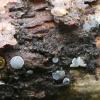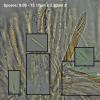
15-01-2026 15:55
 Lothar Krieglsteiner
Lothar Krieglsteiner
this one is especially interesting for me because

17-01-2026 19:35
Arnold BüschlenHallo, ich suche zu Cosmospora aurantiicola Lite

16-01-2026 00:45
Ethan CrensonHi all, On decorticated hardwood from a New York

18-01-2026 12:24
Hello.An anamorph located on the surface of a thin

08-12-2025 17:37
 Lothar Krieglsteiner
Lothar Krieglsteiner
20.6.25, on branch of Abies infected and thickened

10-01-2026 20:00
Tom SchrierHi all,We found picnidia on Protoparmeliopsis mur
Possible Mollisia atlantica?
Hardware Tony,
09-09-2020 21:07
 Not only because I live near the atlantic coast but after careful anaylsis of this record I noted the longer spores and 1-sepatate which pointed me towards M. atlantica. M. cinera and M. palustris which are more common and can appear macro wise similar. This was found on Corylus I think, under damp conditions also with Salix nearby. Narrow asci at 55 x 4.69 with tips bluing. Spores as stated on pictograph 9.0 - 12.17µm x 2.20µm. Rounded both ends rather than pointed.
Not only because I live near the atlantic coast but after careful anaylsis of this record I noted the longer spores and 1-sepatate which pointed me towards M. atlantica. M. cinera and M. palustris which are more common and can appear macro wise similar. This was found on Corylus I think, under damp conditions also with Salix nearby. Narrow asci at 55 x 4.69 with tips bluing. Spores as stated on pictograph 9.0 - 12.17µm x 2.20µm. Rounded both ends rather than pointed.Apprecaite any advice in case this is something esle.
Tony Hardware
Hans-Otto Baral,
09-09-2020 21:49

Re : Possible Mollisia atlantica?
maybe but I am sceptical until you shw me living asci with septate spores. Septa may occur in many species when spores get overmature.
Hardware Tony,
10-09-2020 11:05

Re : Possible Mollisia atlantica?
Thanks Otto, couldn't see spores with septate within the ascus of the images I have so sure you are correct and move back to something like Mollisia fusca. Some of the younger and smaller spores ejected also showed no signs of a septate.
Many thanks Tony
Many thanks Tony
Hans-Otto Baral,
10-09-2020 12:31

Re : Possible Mollisia atlantica?
You could check if the apothecia react yellow in KOH (at 100x or even under the Bino or naked eye). Put an apo in a drop of KOH on the slide. M. fusca reacts yellow, atlantica not.
Hardware Tony,
10-09-2020 17:40

Re : Possible Mollisia atlantica?
Hi Otto,
Unfortunately not possible at this time but something I will take into account in the future if coming across this simiilar species again. Thanks again.
Unfortunately not possible at this time but something I will take into account in the future if coming across this simiilar species again. Thanks again.



